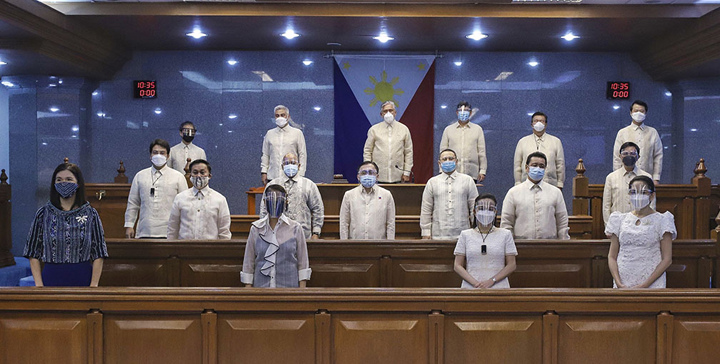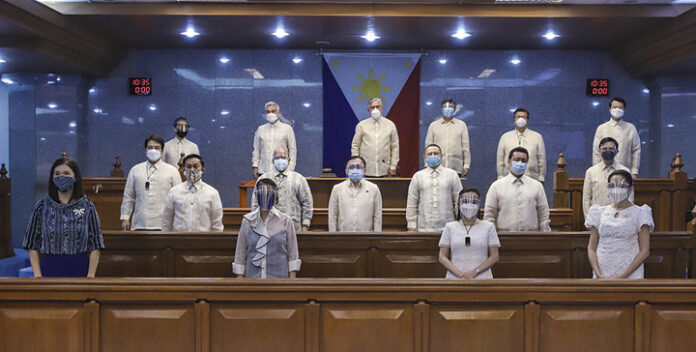
SENATORS see no rush to tinker with the Constitution even as their House counterparts already opened on Monday plenary consideration of proposals to amend the 1987 Charter, starting with its “restrictive economic provisions.”
“Not at the moment,” Senate President Vicente Sotto III told BusinessMirror in a text message when asked if the Senate will follow suit.
Senate President Pro Tempore Ralph Recto promptly thumbed down the House initiative, saying: “I am against Cha-cha (Charter change).”
Senate Minority Leader Franklin Drilon replied in a text message with a curt “No,” when asked about his stand on the issue.
For her part, Senator Imee Marcos voiced doubts “that there is the same broad-based support to amend the Constitution at this time in the Senate.”
Senator Panfilo Lacson, however, left the door open, noting that “it (Charter change) is still being deliberated at the committee level.”
“We will respect the decision of the Chairman and wait when a committee report is filed and presented in plenary,” Lacson added, referring to minority Senator Francis Pangilinan, who chairs the Senate Committee on Constitutional Amendments and Revision of Codes and Laws.
Pangilinan conveyed in a text message to BusinessMirror that “we will be conducting additional hearings,” indicating that the controversial proposal to tinker with the 1987 Charter is not yet ripe for plenary consideration any time soon.
For his part, administration Senator Ronald de la Rosa expressed hope the Senate would follow suit as the House of Representatives has started plenary deliberations to amend the economic provisions of the Constitution.
“If I have my way, I will, since I am one of the authors,” he added, referring to an earlier measure on Charter change which he cosponsored.
House ‘constituent assembly’
Earlier, the House of Representatives, citing its “constituent powers,” kicked off plenary deliberations on proposals to amend what they deem restrictive economic provisions of the Constitution.
In sponsoring the Resolution of Both Houses Number 2 (RBH 2), Committee on Constitutional Amendments Chairman Alfredo Garbin Jr., House Committee on Ways and Means Chairman Joey Sarte Salceda and Marikina Rep. Stella Luz Quimbo cited the urgency to amend the 1987 Constitution to attract foreign direct investments, which badly needed to rebuild Philippine economy shattered by the Covid-19 pandemic.
“With your indulgence, allow me to share estimates from the Department of Finance, which shows that by 2030, if we achieve FDI levels similar to even the most conservative case, namely that of Myanmar, our GDP performance will be 7.9 percentage points higher than where it would be if we make no changes to the investment regime,” he said.
“Investments would be a staggering 10.3 percentage points better than baseline by 2030. Real wages would improve by 5 percentage points more during the same period,” he added.
Salceda said his estimates show that the country stands to gain a total of 6.6 million jobs, if Congress immediately follows RBH 2 with the right enabling laws.
Citing the Organisation for Economic Co-operation and Development or OECD, Salceda said foreign ownership restrictions in the law represent the No. 1 barrier to foreign investment.
Garbin said amending the Charter is important in order to give government the freedom to adopt measures that will pave the way for economic development.
“It is wise for Congress to amend the Constitution by adding the phrase ‘unless otherwise provided by law’ in order to give the government enough flexibility to consider different circumstances prevailing at different stages our road to economic development before formulating policies that should be time bound,” he said.
Quimbo said the need for foreign direct investments became even more urgent as a result of the pandemic.
“As cases began to climb, we imposed restrictions through varying degrees of community quarantine; businesses closed, employees were retrenched; one year later, on January 28, the PSA announced that our economy contracted by 9.5 percent, the steepest economic downturn in our postwar history, and the worst performance in the Asean thus far,” she said.
“Based on my own review of existing literature, 122 out of 167 journal articles provide evidence to support that a more liberal policy can increase our capital, firm productivity, government revenues, GDP growth, and employment. All these are important pathways to reducing income inequality and poverty,” Quimbo said.
“It is not a free pass. By including the phrase ‘unless otherwise provided by law,’ the measure provides flexibility to these economic provisions, but still allows the legislature to address the fear of some of our countrymen that we will be inundated with foreign businesses, to the detriment of local industry,” she added.



